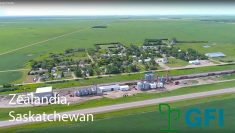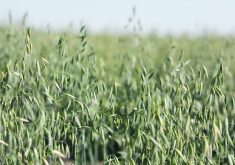WINNIPEG — Yet another company wants to buy pulse crops from Canadian farmers and sell them to the world.
Sadot Group, a firm with headquarters in Fort Worth, Texas, announced this summer that it’s creating a subsidiary in Toronto called Sadot Canada.
In a news release from July unveiling the new division, Sadot Canada said it will focus on peas, lentils, chickpeas, soybeans, vanilla and sesame seeds.
Read Also

Gap in emission regulations hamstrings Canadian hybrid truck manufacturer
A B.C. company building hybrid engines for heavy trucks says they have the opportunity to build something leading edge in Canada, but our own laws are stopping them from doing it.
“Sadot Canada initially plans to focus on two lines of business — container-based pulses exported from Canada to global customers and animal feed ingredient blends sourced globally and imported to North and South American customers,” says the Sadot release.
“The establishment of Sadot Canada aligns with Sadot’s strategic vision to expand its global agri-commodity trading operations and diversify its product lines.”
The Sadot Group is a new player in the world of grain distribution. The company was created in the fall of 2022 by Muscle Maker, an American firm that operates and franchises restaurants called Muscle Maker Grill.
There are Muscle Maker Grills in Florida, New Jersey, New York, Oklahoma and Texas.
Less than two years ago, Muscle Maker launched Sadot LLC, a new subsidiary.
“Sadot LLC will primarily participate in activities such as sourcing, distributing and production of agriculture products. A typical transaction consists of shipping grains via cargo ship from one country,” says a Muscle Maker news release from 2022.
“These transactions could be thought of as “truckers of the seas” and an integral part of feeding the world.”
Sadot has been busy since launching in 2022.
The company has established subsidiary operations in Miami, Dubai, Sao Paulo, Singapore, Kyiv, Toronto and Zambia.
It said it decided to open an office in Toronto because Canada is a “major producer and exporter of grains such as wheat and barley, oilseeds like canola and is one of the dominant (exporters) for key pulses crops such as peas, lentils, beans and chickpeas.”
A Sadot Group report on its financial results for 2023 suggests the company may exit the restaurant business and shift into agriculture.
“The company is fully focusing on the Sadot Agri-Foods division as we have made the decision to explore alternatives, including potentially divesting the company of its restaurant operations.”
Meanwhile, a plant protein company from Regina has expanded its footprint into Montana.
In August, Above Food announced it had purchased the specialty crop food ingredient division of the Redwood Group, LLC, for $34 million.
An Above Food release from the second week of August said the Redwood Group is a “leading supplier of pulses, pulse ingredients and specialty crops to high-growth customer segments in both the human and pet food markets.”
Added Lionel Kambeitz, founder and chief executive officer of the company: “This acquisition marks a major milestone for Above Food and strengthens our international footprint as our first U.S. physical facilities, while also significantly growing our market share of the high-growth pet food category.”
The firm describes itself as an “integrated plant-based food company.” It supplies ingredients to the human and pet food industries and has its own line of retail brands, including egg/meat replacements and plant protein products.
The Regina company was listed on the Nasdaq exchange this summer with trading beginning July 1.
















